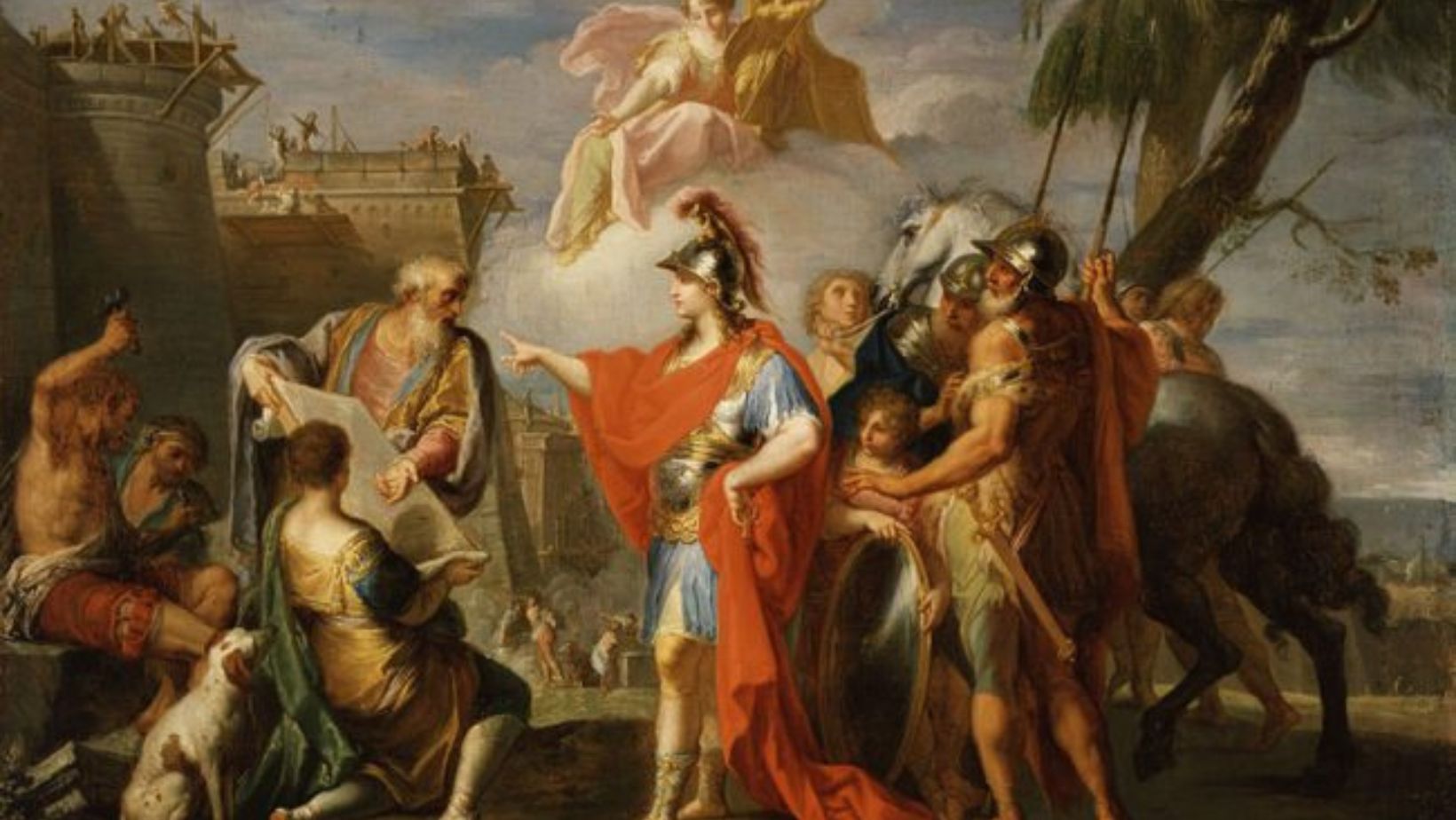When discussing figures who’ve left an indelible mark on history, few names carry as much weight as Alexander the Greats Death. Yet, for all his conquests that reshaped the ancient world, Alexander the Great’s death still captures our imagination today. How did a ruler with such prowess meet his end? With rumors of poisoning to whispers of divine retribution swirling for centuries, let’s journey through time to uncover what happened.
Table of Contents:
- The Rise of Alexander the Great
- The Mysterious Death of Alexander
- Theories on the Cause of Alexander’s Death
- Challenging the Timing of Alexander’s Death
- The Legacy of Alexander the Great
- Conclusion
The Rise of Alexander the Great: Alexander the Greats Death

Alexander the Great’s military genius allowed him to conquer a vast empire stretching from Greece to India. He led his army to victories against the mighty Persian Empire, taking over lands in Asia Minor, Egypt, and Persia.
But Alexander didn’t just conquer—he transformed. He made big changes to the government of the places he took over, putting his loyal generals in charge as satraps. He also brought Greek culture and customs to the conquered lands.
Military Success: Alexander the Greats Death
Alexander was a brilliant military strategist, leading his troops to countless victories. He believed himself to be more than just a man—a god among mortals—and his successes on the battlefield seemed to confirm this to the ancient Greeks.
One of Alexander’s most impressive feats was defeating Darius III, the mighty king of Persia. This victory opened the door for Alexander to take over the massive Persian Empire—not too shabby for a young Macedonian king.
Changes in the Government
Alexander didn’t just conquer lands—he transformed their governments. He appointed his most loyal generals as satraps to govern the new provinces, helping him maintain control over his rapidly expanding empire.
He also worked to spread Greek culture, customs, and language throughout the lands he conquered. Alexander founded new cities, many named after himself, and encouraged his soldiers to marry local women. This blending of cultures had a lasting impact long after Alexander’s death.
The Mysterious Death of Alexander: Alexander the Greats Death
Alexander the Great’s sudden death at age 32 shocked the ancient world. He had created the largest empire ever known, only to have it crumble soon after. So, what exactly killed this legendary conqueror?
The details of Alexander’s death are murky, with conflicting accounts and rumors of foul play. Let’s dive into some of the theories surrounding his mysterious demise.
Rumors of Poisoning
Not long after Alexander’s death, whispers of murder began to surface. Some ancient sources suggest that Antipater, one of Alexander’s most trusted generals, may have conspired to poison the king.
The rumor was that Antipater’s son Cassander brought the poison to Babylon and gave it to his younger brother Iollas, Alexander’s cup-bearer. Iollas then slipped it into the king’s wine.
But was there any truth to these rumors? Or were they just a way for Alexander’s rivals to gain power after his death? Without an autopsy or concrete evidence, we may never know for sure.
Death of Hephaestion: Alexander the Greats Death
Just eight months before his death, Alexander lost his closest friend and possible lover – Hephaestion. The two had been inseparable since childhood, and Hephaestion’s sudden passing devastated Alexander.
Some historians believe that the grief and emotional toll of losing Hephaestion may have contributed to Alexander’s declining health. He engaged in heavy drinking and became more reckless. Could a broken heart have led to the great conqueror’s downfall?
Theories on the Cause of Alexander’s Death: Alexander the Greats Death
For centuries, scholars have debated what killed Alexander the Great. Was it poison? Excessive alcohol? Or some disease? Let’s examine some of the leading theories:
The idea that Alexander was poisoned has persisted throughout history. Proponents point to his sudden onset of severe abdominal pain and the fact that his body allegedly didn’t decompose for several days after death (though this claim is disputed).
However, many modern historians are skeptical of the poisoning theory. There’s no solid evidence to support it, and some of the reported symptoms don’t quite align with typical poisoning cases.
Who Poisoned Alexander?
If Alexander were poisoned, the most likely culprits would be his generals vying for power. Antipater, Cassander, and even Ptolemy have been suggested as potential conspirators.
But again, there’s no smoking gun – only speculation based on rumor and political motives. Accusing a rival of murder would have been a convenient way to remove opposition and claim legitimacy in the chaotic aftermath of Alexander’s death.
Did He Drink Himself to Death?
Alexander was notorious for his heavy drinking and partying ways. Could his love of wine have finally caught up to him?
Some ancient accounts describe Alexander falling ill after a long night of drinking. He developed a high fever and severe abdominal pain – symptoms that might point to alcohol poisoning or pancreatitis. However, this theory doesn’t fully explain the progressive paralysis he suffered in his final days.
Did Alexander Die of Disease?
Many modern scholars believe that Alexander likely succumbed to an illness, not foul play. Various diseases have been proposed over the years, including malaria, typhoid fever, and West Nile encephalitis.
The symptoms described in ancient sources—high fever, chills, abdominal pain, progressive paralysis—could be associated with several different infectious diseases. However, we can only speculate without modern medical records or an autopsy.
One intriguing new theory proposes that Alexander may have suffered from the autoimmune disorder Guillain-Barré Syndrome (GBS). As we’ll explore next, this hypothesis offers a compelling explanation for Alexander’s mysterious decline and death.
Challenging the Timing of Alexander’s Death: Alexander the Greats Death
In 2018, Dr. Katherine Hall, a senior lecturer at the Dunedin School of Medicine in New Zealand, proposed a new theory about Alexander’s death. In an article published in The Ancient History Bulletin, she suggests that Alexander may have suffered from the neurological disorder Guillain-Barré Syndrome (GBS).
GBS is a rare autoimmune disorder that attacks the peripheral nervous system, causing progressive weakness and paralysis. It often begins with symptoms like abdominal pain or diarrhea, which were mentioned in ancient accounts of Alexander’s illness.
As the disease progresses, it leads to ascending paralysis, starting in the feet and hands and moving towards the torso. This aligns with descriptions of Alexander gradually losing the ability to move and speak over several days.
Interestingly, people with GBS often remain fully conscious and aware until the very end, as Alexander reportedly did. And while GBS can be fatal, it’s also possible to survive for some time in a paralyzed state.
This leads to a compelling question: What if Alexander wasn’t dead when his generals declared him so? Hall suggests that Alexander’s body may not have shown immediate signs of decomposition because he was actually still alive, just paralyzed and unresponsive.
Of course, this theory is still speculative and can’t be definitively proven. But it offers a fascinating new perspective on one of history’s greatest mysteries. If Alexander had GBS, it would explain many puzzling details surrounding his death.
The Legacy of Alexander the Great: Alexander the Greats Death

Regardless of how he died, Alexander had a massive impact on the ancient world. In just over a decade, he conquered an empire stretching from Greece to India, toppling the mighty Persian Empire.
But Alexander’s legacy goes beyond his military conquests. He spread Greek culture and language to the far reaches of his empire in a process known as Hellenization. The cities he founded became significant centers of trade and learning.
After his death, Alexander’s empire was divided among his generals, the Diadochi. These dynasties, like the Ptolemies in Egypt and the Seleucids in Persia, established their own dynasties. These Hellenistic kingdoms would shape the region for centuries to come.
Today, Alexander the Great remains one of history’s most enduring figures. His military strategies are still studied, and he continues to capture the popular imagination. The question of his death may never be fully answered, but his life and achievements have secured his place among the most outstanding leaders of all time.
Key Takeaway: Alexander the Greats Death
Alexander the Great’s sudden death at 32 remains a mystery, with theories ranging from poisoning to disease. But his legacy of military conquests and cultural fusion endures, shaping history long after his passing.
Conclusion: Alexander the Greats Death
In wrapping up our exploration into one of history’s greatest enigmas – Alexander the Greats death, we find ourselves no longer looking at just dates and events but at a story rich in intrigue and human complexity. This isn’t merely about how he died; it’s about understanding a figure who lived life so fully yet left us questioning even in his passing. So, while theories abound, from natural causes to nefarious plots—with each offering its own fascinating insights—what remains undeniable is Alexander’s profound impact on history. As we reflect on this journey through antiquity, perhaps what stands out most is not how he met his demise but how vibrantly he lived every moment leading up to it.

